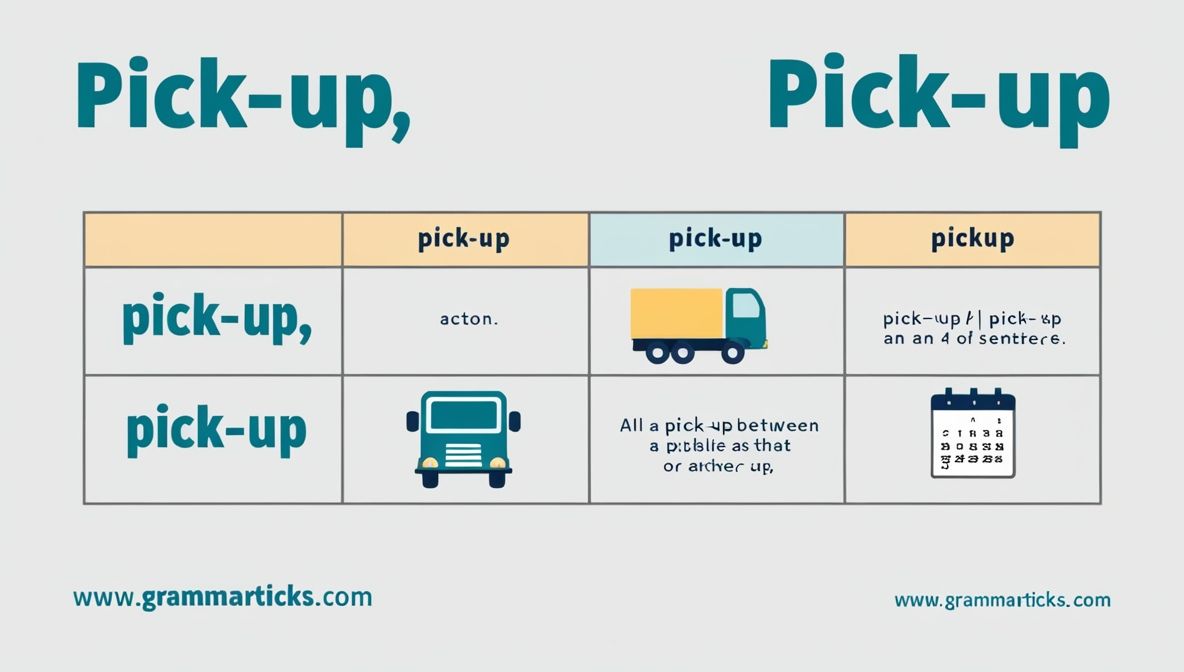Understanding the difference between Pick-Up, Pick Up, or Pickup can be challenging, especially since they sound the same but serve different grammatical functions. Whether you’re dealing with a verb phrase, a noun form, or a hyphenated form, using the correct version is essential for clear and effective communication. These terms are often misused, leading to grammar confusion and misinterpretation in both casual and professional writing.
In this article, we’ll explore how context determines the correct choice. With practical examples and real-life scenarios, you’ll learn how to avoid common grammar mistakes, improve your English writing clarity, and master the subtle differences that matter in everyday language.
Why is There Confusion?
The confusion surrounding pick-up, pick up, and pickup stems primarily from their similar sounds and overlapping meanings. Many people use these terms interchangeably, which can lead to misunderstandings. For instance, in everyday conversation, someone might say they need to “pick up a package,” but they may not realize that this phrase can have different implications based on context.
Context Matters
Understanding the context is crucial when deciding which term to use. Let’s break down the differences:
- Pick-up (hyphenated form): Often used as a noun, referring to an event or action involving collection or retrieval.
- Pick up (verb phrase): Used to describe the action of collecting or lifting something.
- Pickup (single word): Generally refers to a type of vehicle or a service related to collection.
This distinction can affect clarity in communication, particularly in written language.
What is a “Pick-Up”?
A pick-up is primarily a noun that describes an event or action where something is collected or retrieved. This term can be used in various scenarios. Here are some examples:
- Scheduled Pick-Up:”The recycling pick-up is scheduled for Thursdays each week.”
- Pick-Up Event: “The charity is hosting a pick-up for donations this weekend.”
Examples in Context
- Scheduled Pick-Up:”I have a collection scheduled for my dry cleaning on Friday.”
- Pick-Up Location: “The pick-up for auction items is at the community center.”
These examples illustrate how the term pick-up functions within a sentence, emphasizing its role as a noun.
What Does the Phrase “Pick Up” Mean?
The phrase pick up is a verb phrase that describes the action of collecting or lifting something. It can apply to a variety of contexts, from physically lifting an object to the act of collecting items or people.
Scenarios for “Pick Up”
- Collecting Items: “I need to pick up my order from the store.”
- Fetching Someone: “Would you mind picking up my brother from the airport?”
Examples in Context
- Pick Up the Package:”I’ll pick up the package later this afternoon.”
- Pick Up My Order:”Be sure to pick up my order before the store closes.”
These sentences highlight how pick up functions as an action that can occur in everyday life.
What is a “Pickup”?
The term pickup is often used as a noun and commonly refers to a vehicle, specifically a pickup truck. Additionally, it can denote a service related to collection or delivery.
Understanding “Pickup”
Here are some contexts where pickup is appropriately used:
- Pickup Truck: “I bought a new pickup truck for hauling supplies.”
These examples clarify how pickup can refer to both a vehicle and a service, showcasing its versatility.
Which One Should You Use?
Choosing between pick-up, pick up, and pickup depends on the context in which you are communicating.
When to Use Each Term
- Pick-Up: Use this term when referring to an event or action as a noun.
- Example: “The pick-up for donations is at noon.”
- Pick Up: Opt for this phrase when describing the action of collecting or lifting something.
- Example:”I will handle the pick up of my friend at the airport.”
- Pickup: Use this term when talking about a type of vehicle or service.
- Example: “The pickup truck can carry heavy loads.”
Creating a Quick Reference Table
| Term | Part of Speech | Usage Example |
| Pick-Up | Noun | “The pick-up is scheduled for tomorrow.” |
| Pick Up | Verb Phrase | “I will pick up the groceries later.” |
| Pickup | Noun | “He drives a pickup truck.” |
Examples in Context
To further illustrate the differences, let’s look at several scenarios:
Scenario 1: Collecting Goods
- Pick-Up: “The pick-up of auction items is scheduled for Saturday.”
- Pick Up:”I need to pick up the items I won at the auction.”
- Pickup: “The pickup service for the auction is reliable.”
Scenario 2: Transportation
- Pick-Up: “The pick-up will occur at 5 PM for those who signed up.”
- Pick Up: “Would you be able to pick up the kids from school this afternoon?”
- Pickup: “We drove the pickup to the campsite.”
Scenario 3: Services
- Pick-Up:”The pick-up of recycling happens every two weeks.”
- Pick Up:”I’ll pick up my dry cleaning tomorrow.”
- Pickup:”The pick-up location for groceries is at the front of the store.”
These scenarios demonstrate how the terms are used in various contexts, helping to clarify their meanings.
Synonyms and Similar Terms
Understanding synonyms can also aid in grasping the nuances of these terms. Below we explore synonyms for each term.
Synonyms for “Pick-Up”
- Collection: Refers to gathering items or people.
- Retrieval: Implies the act of getting something back.
- Acquisition: Refers to obtaining something.
Synonyms for “Pick Up”
- Fetch: To go and bring something back.
- Lift: To raise something from a lower position.
- Collect: To gather items from various places.
Synonyms for “Pickup”
- Pickup Truck: A type of vehicle designed for transporting goods.
- Pickup Service: A service that collects items or people.
Creating a Synonym Table
| Term | Synonyms |
| Pick-Up | Collection, Retrieval, Acquisition |
| Pick Up | Fetch, Lift, Collect |
| Pickup | Pickup Truck, Pickup Service |
Origins of the Terms
Understanding the origin of these terms can provide additional context for their usage.
Etymology of “Pick-Up”
The pick-up originated in the early 20th century and was used to describe an act of picking something up or collecting items. The hyphenated form emphasizes the action as a noun.
Etymology of “Pickup”
The pickup emerged around the 1930s, primarily referring to a type of truck designed for transporting goods. Over time, it evolved to include services related to collection.
Etymology of “Pick Up”
The verb phrase “pick up” has been in use since the late 19th century, describing the action of lifting or collecting.Its flexibility enables it to be used in different contexts.
Final Thoughts
Understanding the difference between Pick-Up, Pick Up, or Pickup helps you write and speak more clearly. Each one has a different meaning and use. Use pick up as a verb when talking about action. Use pickup as a noun, like a pickup truck or a pickup service. Use pick-up when talking about an event, like a scheduled pick-up.
Remember, small changes in spelling can change the meaning. Knowing when to use each form will make your writing better and help you avoid confusion in daily communication.
FAQs
What’s the difference between pick-up and pickup?
Pick-up is a noun for collection events, while pickup refers to a vehicle or service.
When should I use pick up?
Use pick up when describing the action of collecting or lifting something.
Can I use these terms interchangeably?
No, each term has a specific context and meaning that should be respected.

